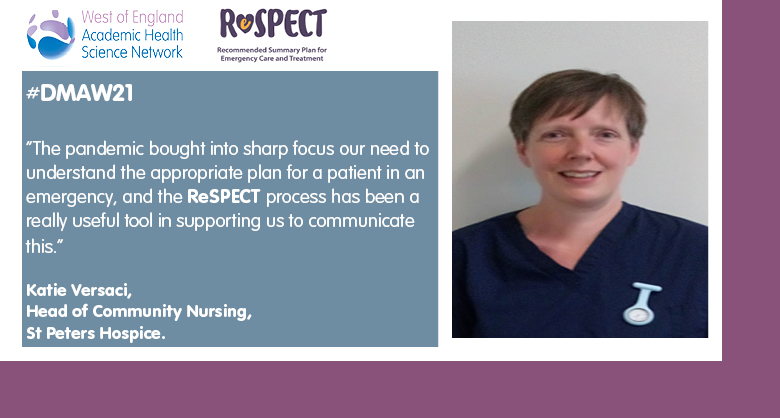
In this blog to mark Dying Matters Awareness Week 2021, Katie Versaci, who is Head of Community Nursing at St Peter’s Hospice discusses working in palliative care during the pandemic and how ReSPECT (Recommended Summary Plan for Emergency Care and Treatment) was used by her and her team to support meeting patient wishes…
I work for a hospice and my role is focused on patients and carers in the community.
At the beginning of the pandemic we prepared to support people dying of COVID-19 in the community, anticipated an overwhelming demand on services, medication and staff shortages. As a team we have had very little involvement in supporting people dying of COVID-19. However the impact of the pandemic on the people that we are used to working with – those living with and dying from life limiting illnesses – has been profound. Negotiating an already complex healthcare system has been hugely challenging for them.
All the things that I love about working with people in their homes- that you are a guest, that there is very little that you can control became things that made it more complicated when we looked at how we could go into people’s homes in a way that was as safe as possible for patients, families and the team.
Overcoming challenges
We have got used to the barrier of wearing PPE. How it affects your presence with people at one of the most challenging times of their lives. Not being able to touch people apart from through gloved hands. Patients and families not being able to properly see your face apart from the picture pinned to your arm. We have learnt little things that make a difference like not putting your mask on until the person has opened the door and seen your face.
For patients having to contemplate the end of their life, where they want to be cared for and die is hard enough without the added consideration of visiting restrictions in care homes and the hospice. For families understanding that by the patient choosing to be at home, in most situations, they are then committed to providing the majority of the person’s care.
Using ReSPECT
The pandemic bought into sharp focus our continued need to understand the appropriate plan for a patient in an emergency, and the ReSPECT process has been a really useful tool in supporting us to communicate this.
During lockdowns there have been times when there are lots of family available to support patients at home. However at some point most patients and families benefit from care. Some have felt very worried about people coming into their home and that it might put the patient or other vulnerable family members at greater risk.
We have learnt lots about the possibilities of telephone and video assessment and the skills needed but also its limitations and the risk that it can leave patients feeling alienated and abandoned.
We have all had our own experiences of living through the last year and have all been affected in one way or another. I find it hard to imagine what it is like to know that you are in the last months of your life in a pandemic and the impact it has had on those last months. ReSPECT has helped us understand our patients’ wishes and work to ensure they are met.
Find out more about ReSPECT here.
Posted on May 14, 2021 by Katie Versaci, Head of Community Nursing at St Peter's Hospice.


